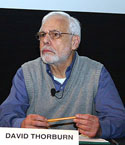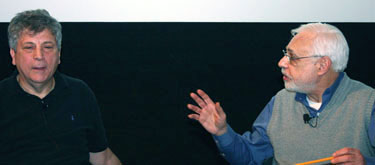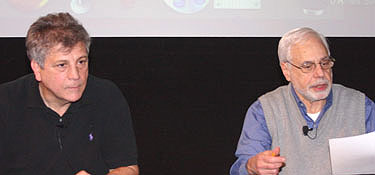| Prime Time in Transition | ||||
|
Thursday, March 6, 2008 John Romano has been writer and producer on more than a dozen shows including Hill Street Blues, Party of Five, and Monk as well as creator of Class of '96, Sweet Justice, and Michael Hayes. His screenwriting credits include The Third Miracle, the Coen Bros.'s Intolerable Cruelty, and the forthcoming Nights in Rodanthe. In a previous life, Romano taught English literature at Columbia University and wrote a critical study of the novelist Charles Dickens. Moderator: David Thorburn is professor of literature and director of the Communications Forum at MIT. He is the author of Conrad’s Romanticism, and, most recently, co-editor of Rethinking Media Change: The Aesthetics of Transition. A downloadable podcast of Prime Time in Transition is now available. A webcast of Prime Time in Transition is now available. [this is an edited summary, not a verbatim transcript]
David Thorburn introduced John Romano as one of the most articulate and thoughtful Hollywood writer-producers, whose credits include work on such landmark TV series as Hill Street Blues, American Dreams, Monk and 24 as well as screenwriting credit on such movies as The Third Miracle and the Coen brothers’ Intolerable Cruelty. But what makes him unique among his Hollywood peers, Thorburn said, are his Ph.D. in English from Yale, his first career as a teacher of literature at Columbia, and his elegant critical book, Dickens and Reality. Thorburn began the conversation by asking Romano about the recently concluded writers’ strike. Many people believe the outcome was at best a modest victory for the writers. Will this settlement actually make a difference for writers themselves or for the industry?
Romano was certain there would be changes, since the industry as a whole is being transformed by the rise of downloads, DVDs and content on demand. But while major changes are inevitable, it's too soon though to know exactly what the economic impact will be. He said he supported the strike himself and walked the picket lines. In his view, the studios seemed to have a little “wet dream” that they were going to profit from the Internet without sharing the money with anyone, and that's just common sense unfairness. It seems obvious that zero percent of the profits was the wrong number, and while the small percentage the writers received in the settlement wasn't exciting, it did establish an important basic principle -- that the studios can't market scripted material without giving some of the money back to the writers. Thorburn asked about the rise of reality programming and the apparent decline in the popularity of fictional series. Is this a permanent change, he asked, or will story-forms regain their dominant role in prime time? Romano acknowledged that narrative forms were less numerous today than in the past. But, he explained, if you want to tell TV stories, there is and always will be an appetite for the next really good one. Studio executives will tell you there's still money in good stories. Cable networks such as HBO and Showtime seem the likely destination for series and films with complex themes and characters. Despite the competition from reality programming and game shows, TV will always be a place for story-telling. Thorburn asked how network television has changed over time. He suggested that the mid-70s to the mid-80s were one of the most creative times for fiction TV and that the events of 9/11 have had a profound impact on the content and programming. Romano thought that Lost was a good example of post-9/11 programming: a large cast of characters stranded on an island surrounded by mysteries and danger. 9/11, he continued, has fed some of our more fearful impulses – xenophobia for example. It has made evil a more palpable element of storytelling. He cited the film No Country for Old Men as an instance of this awareness or belief in the existence of unmitigated evil, a theme he believes resonates for the post-9/11 audience. He finds this notion of a world in which good and evil collide – especially the implication that not every problem can be solved with a hug – potentially helpful for story-telling. He likes the opportunity to “jam the characters up,” to make things as hard as possible for them. He cited 24 as an example of a TV show that confronts the presence of evil forces in the world. As Romano explained it, Jack, the protagonist of 24, faces the dilemma of contending with implacably evil enemies while still preserving his own humanity. Romano expanded on this theme. Many of these shows have a naïve faith that somehow someone will invent the right widget to solve whatever problem is being faced. The interesting problem that many programs ignore is that even with the right widget, the characters still need to make the right decisions. Bad shows let the widget solve the problems; good shows allow the widget to be factored into the thinking process. That element of human fallibility and doubt makes good TV. As an example he pointed to early episodes of Law and Order. Often the viewers didn't know if the good guys would win or even if they should win – and the good guys on the show wondered the same thing. “That was good TV,” Romano said.
Turning to a concrete example, Thorburn screened the opening scene of the pilot episode of 24, which Romano had written. The scene introduces Jack and his family in typical domestic circumstances. The sequence contains no overt evidence that Jack is an intelligence agent and concludes with his daughter’s disappearance from her room. The audience does not yet know she’s been kidnapped and probably assumes she’s run off in defiance of her parents. The dialogue – including such lines as “Call her by her real name” and “She's manipulating you” – was consciously chosen for their connection to “spy language.” The scene aimed to dramatize an apparently bland and ordinary evening – something that might happen in any home – but implicitly flavored by the fact that Jack is a spy. The combining or blurring of the human or personal and the political was a key to the scene. Because he is no longer working on the program, Romano was reluctant to criticize 24. But he admitted he feels the series has moved away from its human side and has lost its “sense of manners.” Thorburn introduced a second video clip to clarify what he’d said about the experimental character of some programming in the 1980s. Suggesting that many series began to twist or subvert familiar situations, he screened the “roll call” scene from an early episode of the short-lived series Cop Rock, which drew on the conventions established in Hill Street Blues. The scene begins in conventional fashion but with the sergeant's familiar admonition to “Be safe out there,” the show turns into a musical, a sort of police opera. Romano admitted to being a little embarrassed by the program today. In most programs, a bad scene means the audience will go and grab a snack; a bad song means they change the channel. As he reflected on the program he asked, “What went wrong?” “You don't march on Moscow, you don't fight a land war in Asia and you don't make a show with singing cops,” he concluded. The series relied on some great songwriters, but they were being asked to create five major songs for every episode, an almost impossible assignment. Good musical numbers cannot be grounded entirely in irony. You can't just have wise-cracking songs, but TV of that era was nearly always ironic. Sentiment was suspect and mostly avoided. But audiences want genuine emotions, not always smirks and wisecracks. This ironic or cynical tendency, he said, is demonstrated clearly in No Country for Old Men. Something of the same impulse can be seen in the earlier Coen brothers film Intolerable Cruelty where all of the characters were selfish and immoral at some level. In his original screenplay for the film, Catherine Zeta Jones' character was to have been an ordinary housewife seeking revenge for having been wronged. The final version, radically changed by the brothers, was perhaps funnier but less powerful and morally engaging in his opinion. All the characters in the film were bad in one way or another and go after each other tooth and nail. Discussion QUESTION: Looking at TV content over the past 30 years, given the rich spectrum of human stories that might be told, why the obsession with crime drama? Is it the TV industry or the viewers? ROMANO: I think the fascination with crime and punishment is hardwired into human beings. In some ways you can think of Sophocles’ Antigone as a cop show. The policeman is an inherently fascinating figure. He works at a juncture of social forces, deals with crime and disorder, yet at the same time he has to live his life and go home to a family. QUESTION: I watch a lot of late night TV and notice that it tends to be about things that are scary and fearful – medical mysteries, true crime, etc. Why are they on so late? ROMANO: There's a voyeurism, almost a pornography, to those programs. The writers are often slumming documentarians. There will always be an appetite for content that taps into our sleepless anxieties. One thing that TV does not do very well – at least not as well as the movies – is violence. Increasingly, for titillating content the Internet is coming out the winner. QUESTION: Are you familiar with Dexter? I'm curious what you think of the program and how it is written. ROMANO: I think it's exciting. The most adventurous thing about Dexter is that it's told from the point of view of a serial killer. It makes sense to me. About the writing – and about writing for emerging TV formats and programs in general - we're still trying to figure that out. Sometimes you'll have a scene that there isn't time for in the show that can be made available online. And then you can start shooting scenes specifically to appear online and to reinforce the story. That's very tempting for a writer. It's fun.
THORBURN: This is an example of the “destabilization of the text.” With so many potential venues for content, the idea of story-telling is changing. We live in an era when platforms become obsolete and where content can be lost as a result. QUESTION: I'm interested in the Dickens background, his sentimentality and work as a serialized writer. ROMANO: I like the question. The weekly serialization of Victorian content was very interesting. It was brought into the home and read and shared with the family much like television today. The serials also had advertising like today's TV. Dickens was avid in watching the sales numbers. If he saw sales of a story starting to dip he would make changes to increase its popularity. Hollywood writers do the same thing today. The most profound link between Dickens and today is the sentimentality. He was a middle class writer writing about ordinary human lives. The stuff of ordinary human life was fodder for the Victorian imagination and remains so today. Thinking back to the earlier question about late-night TV, there's a very private relation between the viewer and content at 3 a.m. During prime time people tend to view TV with others while late night it's more intimate, more like the solitary relation between the reader and the book. QUESTION: How have you dealt with the issue product placement? ROMANO: On American Dreams we had an aggressive executive producer who kept the show on the air through placements. It gets really boring for a writer, though, to have to keep referencing products. This practice is more prevalent today on TV. In movies it's more buried – limited to the things you see rather than something you hear worked into the script. As a writer I hate artificial limits and being told to write something that isn't from my imagination.
|
||||




